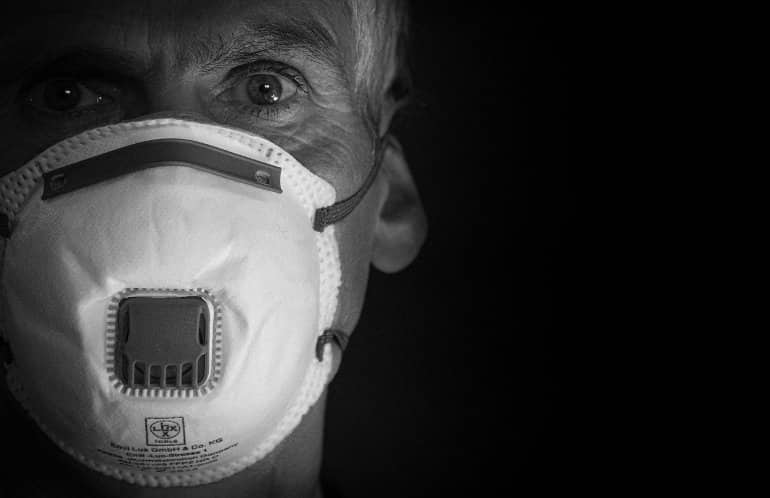Summary: COVID-19 breakthrough cases that result in severe infection, hospitalization, or death are more likely in those with cancer and Alzheimer’s patients.
Source: Case Western Reserve
Breakthrough COVID-19 cases resulting in infections, hospitalizations and deaths are significantly more likely in cancer and Alzheimer’s patients, according to two new studies from researchers at the Case Western Reserve University School of Medicine.
People within these diseases are often more susceptible to infection in general, the researchers explained, and are among the population’s most vulnerable to severe health outcomes from COVID-19 infections as well. The studies come as the U.S. total of COVID-19 deaths since the pandemic began surpassed 1 million.
Examining breakthrough infection rates in cancer patients
The first study, published recently in Journal of the American Medical Association (JAMA) Oncology, analyzed electronic health records to track the number of breakthrough COVID infections, hospitalizations and mortality rates among vaccinated patients with cancer.
A “breakthrough infection” is when a fully vaccinated person contracts COVID, according to the Centers for Disease Control and Prevention (CDC).
The research team counted people diagnosed with the 12 most common types of cancer: lung, breast, colorectal, bladder, liver, endometrial, skin, prostate, thyroid and blood cancers. These participants received COVID-19 vaccinations between December 2020 and November 2021 and had not previously been infected. The control group consisted of vaccinated participants without cancer.
The researchers compared breakthrough COVID-19 infections between cancer and non-cancer participants, matching for comorbidities, social determinants of health, age and gender, and other demographics. The team analyzed the records of more than 636,000 vaccinated patients, including more than 45,000 vaccinated people with cancer.
“This study showed significantly increased risks for COVID-19 breakthrough infection in vaccinated patients with cancer, especially those undergoing active cancer care, with marked variations among specific cancer types,” said Rong Xu, professor of biomedical informatics at the School of Medicine and coauthor of this study.
Study coauthors include David Kaelber, professor at the School of Medicine and chief medical informatics officer at The MetroHealth System.
The team found:
- The overall risk of breakthrough COVID infections in vaccinated people with cancer was 13.6%, compared to 4.9% for vaccinated people without cancer.
- The highest risk of breakthrough infections was in people with pancreatic cancer at 24.7%, liver cancer 22.8%, lung cancer 20.4% and colorectal cancer 17.5%.
- Cancers with lower risk of breakthrough infections included thyroid 10.3%, endometrial 11.9%, and breast 11.9%.
- The overall risk for hospitalization following a breakthrough infection, in study participants with cancer, was 31.6%, compared to a rate of with 3.9% in those without cancer.
- The risk of death was 6.7% following a breakthrough infection, compared to 1.3% in patients without cancer.
“Breakthrough infections in patients with cancer were associated with significant and substantial risks for hospitalizations and mortality. These results emphasize the need for patients with cancer to maintain mitigation practice, especially with the emergence of different virus variants and the waning immunity of vaccines,” said Xu and study coauthor, Nathan Berger, the Hanna-Payne Professor of Experimental Medicine at the School of Medicine.
Health outcomes in patients with Alzheimer’s disease following COVID infection
In a second, separate School of Medicine study, researchers analyzed electronic health data to examine the incidence rate of breakthrough COVID-19 infections in those diagnosed with some subtypes of dementia.
The study was recently published in the journal, Alzheimer’s & Dementia.
The researchers chose to examine data on breakthough COVID-19 cases in those with dementia because, while vaccines are effective, breakthrough infections are possible, and older adults with dementia were underrepresented in vaccine clinical trials.
For example, in the clinical trial for Pfizer-BioNTech vaccine, the median age for the 37,706 participants was 52 years and included only 18 people with dementia, or just 0.05%, according to the study.
The researchers examined anonymous electronic health data from more than 262,847 adults 65 or older vaccinated between December 2020 and August 2021, and who didn’t have the infection before being vaccinated. Of that number, 2,764 people were diagnosed with Alzheimer’s disease; 1,244 with vascular dementia, 259 with Lewy body dementia, 229 with frontotemporal dementia and 4,385 with mild cognitive impairment.

The researchers compared the overall risks of breakthrough infections in vaccinated patients with dementia to those without any congitive impairment.
Vaccinated patients with dementia had an overall risk for breakthrough infections ranging from 10.3% for Alzheimer’s disease to 14.3% for Lewy body dementia, significantly higher than the 5.6% in the vaccinated older adults without dementia.
“Patients with dementia have a significantly higher rate of breakthrough COVID infections after vaccination than patients of the same age and risk factors other than dementia,” said Pamela Davis, the Arline H. and Curtis F. Garvin Research Professor at the School of Medicine.
“Therefore, continued vigilance is needed, even after vaccination, to protect this vulnerable population. Caregivers should consider ongoing masking and social distancing, as well as booster vaccines to protect these individuals.”
About this COVID-19 research news
Author: Megan Hahn
Source: Case Western Reserve
Contact: Megan Hahn – Case Western Reserve
Image: The image is in the public domain
Original Research: Open access.
“Breakthrough SARS-CoV-2 Infections, Hospitalizations, and Mortality in Vaccinated Patients With Cancer in the US Between December 2020 and November 2021” by Rong Xu et al. JAMA Oncology
Abstract
Breakthrough SARS-CoV-2 Infections, Hospitalizations, and Mortality in Vaccinated Patients With Cancer in the US Between December 2020 and November 2021
Importance
Limited data have been presented to examine breakthrough SARS-CoV-2 infections, hospitalizations, and mortality in vaccinated patients with cancer in the US.
Objectives
To examine the risk of breakthrough SARS-CoV-2 infection, hospitalizations, and mortality in vaccinated patients with cancer between December 2020 and November 2021.
Design, Setting, and Participants
Retrospective cohort study of electronic health records (EHRs) of vaccinated patients from a multicenter and nationwide database in the US during the period of December 2020 through November 2021. The study population comprised patients who had documented evidence of vaccination (2 doses of Moderna or Pfizer-BioNTech or single dose of Janssen/Johnson & Johnson vaccines) in their EHRs from December 2020 to November 2021 and had no SARS-CoV-2 infection prior to vaccination.
Exposures
The 12 most common cancers combined and separately; recent vs no recent encounter for cancer; and breakthrough SARS-CoV-2 infection.
Main Outcomes and Measures
Time trends of incidence proportions of breakthrough SARS-CoV-2 infections from December 2020 to November 2021 in vaccinated patients with all cancer; cumulative risks of breakthrough infections in vaccinated patients for all cancer and 12 common cancer types; hazard ratios (HRs) and 95% CIs of breakthrough infections between propensity score–matched patients with vs without cancer and between propensity score–matched patients with cancer who had a recent medical encounter for cancer vs those who did not; overall risks, HRs, and 95% CIs of hospitalizations and mortality in patients with cancer who had breakthrough infections vs those who did not.
Results
Among 45 253 vaccinated patients with cancer (mean [SD] age, 68.7 [12.4] years), 53.5% were female, 3.8% were Asian individuals, 15.4% were Black individuals, 4.9% were Hispanic individuals, and 74.1% were White individuals. Breakthrough SARS-CoV-2 infections in patients with cancer increased from December 2020 to November 2021 and reached 52.1 new cases per 1000 persons in November 2021.
The cumulative risk of breakthrough infections in patients with all cancer was 13.6%, with highest risk for pancreatic (24.7%), liver (22.8%), lung (20.4%), and colorectal (17.5%) cancers, and lowest risk for thyroid (10.3%), endometrial (11.9%), and breast (11.9%) cancers, vs 4.9% in the noncancer population (P < .001).
Patients with cancer had significantly increased risk for breakthrough infections vs patients without cancer (HR, 1.24; 95% CI, 1.19-1.29), with greatest risk for liver (HR, 1.78; 95% CI, 1.38-2.29), lung (HR, 1.73; 95% CI, 1.50-1.99), pancreatic (HR, 1.64; 95% CI, 1.24-2.18), and colorectal (HR, 1.53; 95% CI, 1.32-1.77) cancers and lowest risk for thyroid (HR, 1.07; 95% CI, 0.88-1.30) and skin (HR, 1.17; 95% CI, 0.99-1.38) cancers. Patients who had medical encounters for cancer within the past year had higher risk for breakthrough infections than those who did not (HR, 1.24; 95% CI, 1.18-1.31).
Among patients with cancer, the overall risk for hospitalizations and mortality was 31.6% and 3.9%, respectively, in patients with breakthrough infections, vs 6.7% and 1.3% in those without breakthrough infections (HR for hospitalization: 13.48; 95% CI, 11.42-15.91; HR for mortality: 6.76; 95% CI, 4.97-9.20).
Conclusions and Relevance
This cohort study showed significantly increased risks for breakthrough infection in vaccinated patients with cancer, especially those undergoing active cancer care, with marked heterogeneity among specific cancer types. Breakthrough infections in patients with cancer were associated with significant and substantial risks for hospitalizations and mortality.






